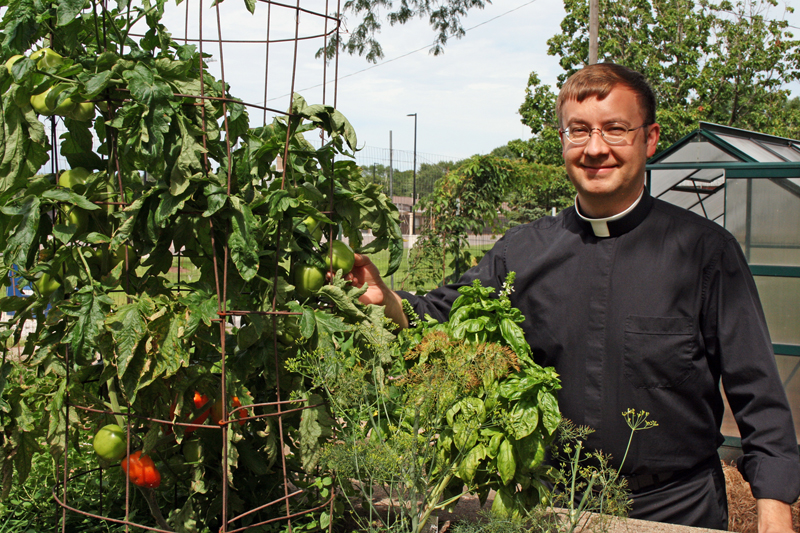By Fr. Thom Hennen
This summer I decided I would try my hand at gardening. I decided I would start very small with three raised beds in a fenced-in garden just outside my apartment at the Chancery. That’s as much as I felt I could handle as a “newbie” gardener.

Father Thom Hennen shows off some of his tomatoes that he is growing this summer.
In early June I was starting a little late, but still in plenty of time to grow some things. I wasn’t even really sure what I wanted to plant. I thought I would try a variety of things and see what I couldn’t kill. I went to a couple of garden centers and picked up a few starters (not having the patience to start from seeds). I bought one tomato plant, some basil, oregano, mint, parsley and chives, as well one plant each of yellow wax beans, Swiss chard, celery and kale. I also found some volunteer dill and something that looked like a type of lettuce or spinach already growing in one of the raised beds. After getting everything in, I began to water regularly (depending on rain) and monitor the progress almost daily.
Why am I telling you this? In this process I learned a few principles that could just as well apply to my ministry as the vocation director for the diocese:
• Figure out what’s what. That stuff I thought was some kind of lettuce or spinach turned out to be a rather robust weed with milky veins. After consulting with others who know their plants better than I do, we determined it was nothing I would want to eat and I removed it. In the same way, part of vocations ministry is discerning in consultation with others what is an authentic calling that should be nurtured and what may only appear to be an authentic calling, but is actually misplaced.
• You reap what you sow. I learned that one plant of beans isn’t nearly enough. I joked how I was looking forward to making a “three-bean salad,” as in three individual beans. I did harvest my beans the other day and got maybe eight, enough for a nice side with dinner. They were delicious, but I will definitely try for more next year. The lesson here is that when it comes to vocations, we shouldn’t sow sparingly. Rather, we should be generous in our efforts to encourage and invite.
• Sometimes you get more than you bargained for. Unlike my beans, I found that one plant each of mint, parsley and oregano is plenty. Also, at last count I had over two dozen tomatoes growing on my one plant. Often in vocations work I am amazed at how fruitful small efforts can be. Something as simple as replying to an e-mail, returning a phone call or extending a well-timed invitation can often yield a greater return than ever imagined.
• There’s always weeding to be done. Apart from the exciting work of planting, watering, pruning and harvesting, I could easily spend a few minutes almost every night plucking weeds. In the same way, vocations ministry isn’t always about applications and ordinations. There are a lot of little daily tasks that may be less exciting, but are no less necessary.
• There’s nothing better than tasting the fruits of your labor. When I told my brother who loves to cook what I had growing in my garden he said, “Oh, you could make Tabbouleh!” I knew vaguely what it was, but still had to look it up. It’s a Middle Eastern cold salad made with bulgur wheat, tomatoes, cucumber, green onions, parsley and mint. Apart from the tomatoes (as mine weren’t ripe yet), the cucumber and the bulgur wheat, I could gather everything from my own garden (substituting chives for the onions). It was good! After all my work and patience, it was wonderful to actually taste and be nourished by something I had helped to grow. In the same way, in vocations ministry it is wonderful to see the ordinations or get the invitations to first or final religious professions and to be ministered to by those I helped in some small way to answer God’s call.
• God does most of the work. Yes, I planted, tended, watered and pruned, but God made the plants, the soil, the water, the sun … and me. I merely helped to facilitate a process that has gone on without me just fine for a very long time. I simply aided some plants in doing what they are already designed to do. In the same way, in vocations ministry I realize that I am a temporary steward of “God’s garden” and a collaborator with him in his work.
What a blessing, both nutritionally and spiritually, this little garden has been. I can’t wait to see what I can do with it next summer!
(Fr. Hennen is vocations director for the Davenport Diocese. Contact him at (563) 888-4255 or hennen @davenportdiocese.org.)











